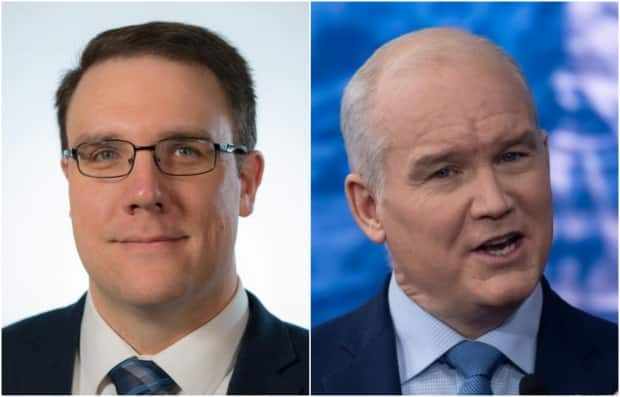Alberta government to review federal Conservatives' carbon plan

Alberta Environment Minister Jason Nixon says the province is encouraged the federal Conservatives would scrap the current carbon tax if elected — even if replacing it still means consumers would pay.
On Thursday, Conservative Leader Erin O'Toole announced his approach, a levy on fuel and other carbon-emitting purchases that would fund personalized savings accounts.
Canadians could use the money only on environmentally friendly purchases like bikes or bus passes, even furnace upgrades, much like a rewards card.
"We will need to consider what their proposed price on carbon and introducing personal low carbon savings accounts would mean for Alberta residents," said Nixon in a statement.
The province is in the midst of engaging stakeholders on Alberta's future climate policies and plans, after losing the Supreme Court battle to repeal the current carbon tax, which was designed by the federal Liberal government.
Premier Jason Kenney's government didn't prepare a backup plan on implementing a consumer carbon tax, betting on a win at the Supreme Court.
"We will review the proposed plan from Mr. O'Toole to determine how it respects provincial jurisdiction in the management and development of natural resources," read Nixon's statement.
The statement goes on to stress that any new climate plan at the federal or provincial level must minimize costs to Albertans and exposed industries while simultaneously responsibly reducing emissions.
Currently, Alberta pays a federally imposed levy, which went up to $40 a tonne this month and is set to rise to $50 a tonne next year.
The Conservatives' carbon levy would initially cost $20 per tonne of greenhouse gas emissions.
Kent Fellows, an economist at the University of Calgary's School of Public Policy, said it's encouraging that the federal Conservatives are putting together a plan.
"This is kind of taking us from the debate about whether we need to do anything, or the debate about whether plans can reduce emissions, to a debate about what's the correct plan to get the emissions where we want to get them."
He said the Conservative plan is similar to what's already in place. The big difference is at the consumer level — moving away from the standard market-based mechanism to something more targeted in terms of how the rebate is spent.
"Really, it's a case of can Alberta continue to take this seriously, can we head the feds off at the pass on some of this stuff by introducing our own regulations and saying, 'No, we have these standards already, we don't need the federal intrusion.'"
But that's only an issue if the Conservatives are elected in 2023.
At the pumps, Albertans are divided on the Conservative plan. Some say climate policy that will move Canada toward reducing carbon emissions is needed, while others say the oil and gas industry is already responding to international pressures to green operations.
"It's money people are paying as they consume energy, for them it feels like a tax," said Mount Royal University political scientist Lori Williams. "Whether it's rebated once a year or put in a savings account, I don't think it makes much of a difference to most."
Williams believes Albertans recognize there has to be a better balance between energy and the environment.
A carbon tax may turn off some conservative voters, but Williams said conservatives don't have many alternatives at the polls.
"It might well make some people angry," Williams said. "Conservatives aren't in a great place in the polls today and it's not clear to me that this is going to do the job Conservatives need it to do of attracting new voters while keeping the voters they already have."

